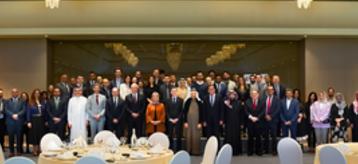Bahrain’s current account ‘could remain in surplus’
Bahrain’s current account is expected to remain in surplus throughout Q1-2022, backed by strong economic data into the second half of 2021 coupled with the improved outlook for oil prices, British multinational bank HSBC has said.
The bank’s latest quarterly economic report on the Central and Eastern Europe Middle East and Africa (CEEMEA) region describes Bahrain generating a second successive quarterly current account surplus in Q32021 as a “remarkable improvement” on the near double-digit deficit recorded the previous year.
The research includes a special focus on eight countries including the kingdom and notes that strong data into the second half of 2021 coupled with the improved outlook for oil prices suggests that Bahrain’s pronounced balance sheet strains will continue to fade over the forecast period.
The assessment finds that the stronger-than-expected performance last year reflected not just higher energy earnings but also a rapid recovery in non-oil exports and services receipts following the relaxation of Covid-19 restrictions on cross-border activity.
“Even allowing for a pick-up in the import bill as growth recovers, we now see the current account in surplus throughout our forecast period (previously we saw deficits of some 4pc of GDP) for the first time since 2013-14,” says the bank’s chief economist Simon Williams.
“This should allow the central bank to add to reserves that were rising strongly into year-end, rebuilding buffers that came close to exhaustion in 2020 when the pandemic was at its peak.”
HSBC also notes sustained declines in expatriate remittance outflows over 2021 – an outcome consistent with the double-digit drop in the non-Bahraini workforce since the pandemic hit, which is unlikely to reverse quickly.
Mr Williams adds that the bank has incorporated higher oil prices and the increase in VAT to 10pc into its forecasts, which should see the fiscal deficit fall to around 2pc of GDP over 2022-23.
“That would be the best outturn since 2012, but the shortfall could fall faster still if the authorities follow through on pledged spending cuts in 2023, potentially putting the policy target of a balanced budget in 2024 within reach.”
Bahrain’s demanding repayment schedule will add another 4-5pc of GDP to the overall funding requirement, but improvements in credit fundamentals and the sovereign rating have enhanced access to new funding, the report adds.
The strong statements of support Saudi Arabia, the UAE and Kuwait made for Bahrain’s adjustment programme also suggest fresh concessional funding might be made available if required.
“Even in these favourable circumstances, we see the debt stock staying high at around 100pc of GDP and the public balance sheet dominated by energy receipts,” opined Mr Williams.
The economist also sees ongoing fiscal consolidation weighing on a recovery that was slow to gain speed and will likely not see GDP return to its prepandemic level until 2023.
Another key reason for optimism is the government’s announcement of a $30bn (70pc of GDP) ‘strategic projects programme’ which could also see capital outlays recover faster than it anticipates, says HSBC, while noting that funding has not yet been identified for the 22 projects that lay behind the scheme.


